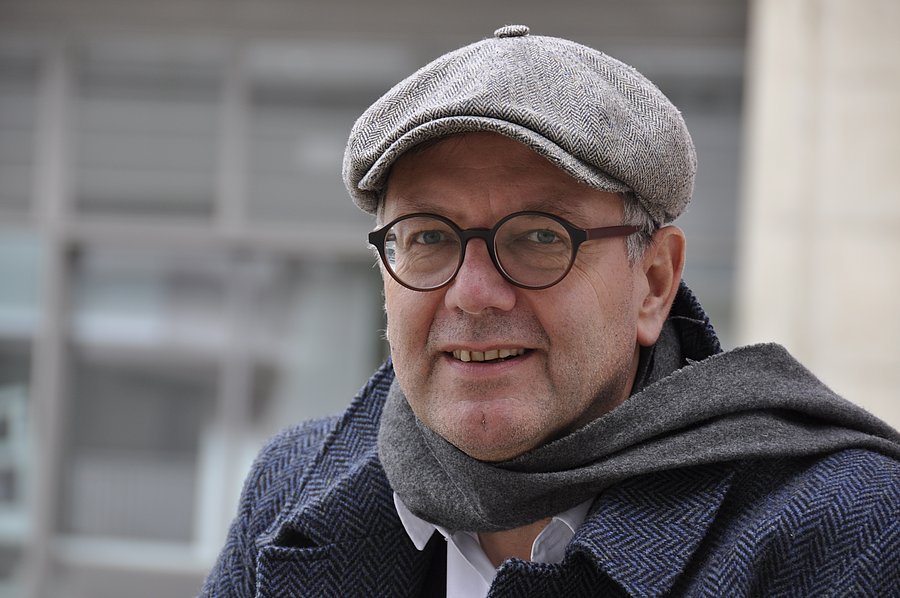
Prof. Dr. Gerald Hartung / Philosophie
Foto: UniService Transfer
What’s a Philosopher Doing at the Zoo?
A conversation with Professor Dr. Gerald Hartung
According to, Professor Dr. Gerald Hartung, a German philosopher and Professor of Cultural Philosophy and Aesthetics at the University of Wuppertal: “Research involves making philosophical schools of thought visible”. He made the remark during a knowledge-transfer conversation with Prof. Dr.-Ing. Anke Kahl, VC for Finance, Planning and Research & Knowledge Transfer and Dr. Peter Jonk, Head of the Research & Knowledge Transfer Office at the University of Wuppertal.
Professor Hartung’s work is primarily focused on Cultural Philosophy, Philosophical Anthropology, the History of 19th and 20th-century Philosophy, the Theory of Philosophical History, and Textual Scholarship. Beyond that, he devotes his time to studying the History of Philosophy and Science in the 19th and 20th-centuries as well as Modern German-Jewish Cultural and Intellectual History. Among other achievements, he is joint editor of the multi-volume work: Grundriss der Geschichte der Philosophie. Die Philosophie des 19. Jahrhunderts. Philosophie im deutschsprachigen Raum.
The interviewer was particularly interested in Hartung’s interpretation of the transfer concept. Hartung’s views on this subject are very clear. For him, the term “transfer” refers to the dissemination of know-how to a heterogeneous public (i.e., a broad cross-section of society) and not so much the transfer of knowledge to other experts.
In practical terms, he implements the transfer concept, inter alia, via a project partnership known as “School of Thought”, which is funded by the Robert Bosch Foundation (Robert Bosch Stiftung GmbH). Orientation courses are developed together with researchers, students and schoolchildren, all of which pertain to the project topic: “which nature do we need for a good life? On the meaning of nature in the 21st century”. These courses can serve as the basis for a conscious and sustainable management of nature as the natural habitat of mankind.
Degas und Rodin – a lecture series at the Von der Heydt Museum
In parallel with the major exhibition “Edgar Degas and Auguste Rodin – Giants in the Race to Modernity”, Professor Hartung will be organising a series of lectures at the Von der Heydt Museum. In the course of six evening events – between 2016 and January 2017 – representatives of Art Studies, Romance Studies, Cultural Studies and Philosophy will be delivering a series of lectures during the course of which ideas present in the exhibited works will be picked up and developed in relation to the relevant disciplinary perspectives. A common theme running through all lectures is shared journeys into the impressive cultural scene of 19th-century Paris, dominated, as it was, by the painting of light and impressionist sculpture.
The next lecture will be held on the 17th The 01rd 2017 at the Von der Heydt Museum. Prof. Dr. Hans Körner (Düsseldorf) will be discussing “Uncut Stone and Statuary – The Materiality of Memory in 19th and early 20th-Century French Memorials”.
Wuppertal Zoo Discussions
In addition there are the so-called “Wuppertal Zoo Discussions” that have been taking place since 2012 as part of the General Studies lecture series “What is a Human?” in the zoo’s ape enclosure. This collaboration between the University of Wuppertal Philosophy Section and Wuppertal Zoo now constitutes a distinct lecture series on Primatology as well as Biological and Philosophical Anthropology. Reports on current research and scientific findings are presented in the course of these evening lectures each of which includes a discussion round.
And yes, it really does push philosophical schools of thought into the limelight, for Prof. Hartung was awarded the “Innovation Prize”, a category of the so-called Wuppertaler Lehrlöwen (teaching lions) in 2016 for outstanding teaching.
The next Zoo Discussion is scheduled to take place on the 24th of January 2017 at 18:00 at the Wuppertal Zoo’s ape enclosure. Prof. Dr. Roland Borgards (Würzburg) will be lecturing on “Literary Primatology: Wilhelm Hauff’s fairytale The Ape as Man (Der Affe als Mensch)”.
(Talk from June 2016)
Prof. Dr. Gerald Hartung achieved his habilitation (i.e., a post-doctoral qualification) in 2002 at the Faculty of Social Sciences and Philosophy at Leipzig University, where he continues to work as a senior academic assistant. He first came to the University of Wuppertal as a deputy professor in 2008 and became Professor of Cultural Philosophy and Aesthetics in 2010.
https://www.philosophie.uni-wuppertal.de/de/personen/gerald-hartung/
